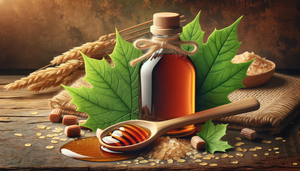Prebiotics in Maple Syrup
Jul 11, 2024
Images of warm, golden liquid drizzling over pancakes come to mind when we think of maple syrup. This beloved sweetener, cherished by foodies, breakfast lovers, and culinary enthusiasts alike, offers more than just a delightful taste. Emerging research reveals that maple syrup is a powerhouse of prebiotics—natural, non-digestible food components that promote the growth of beneficial bacteria in our gut. Let's delve into the prebiotic properties of maple syrup and its positive impact on gut health.
The Science Behind Prebiotics in Maple Syrup
Maple syrup, especially the pure, artisanal varieties produced using traditional methods in places like Vermont, is rich in oligosaccharides. These are complex sugars that our bodies cannot digest. Instead, they pass through the stomach and small intestine, reaching the colon, where they become food for our gut's beneficial bacteria.
Key Prebiotic Components in Maple Syrup:
- Oligosaccharides promote the growth of probiotics, the good bacteria in your gut.
- Antioxidants: Maple syrup contains over 24 different antioxidants, which help reduce oxidative stress in the digestive tract.
- Polyphenols: These compounds have anti-inflammatory properties, supporting overall gut health.
The Positive Impact on Gut Health
Consuming prebiotics like those found in maple syrup can lead to a healthier digestive system. Here are some of the benefits:
- Improved Digestion: Prebiotics stimulate the growth of probiotics, enhancing digestion and nutrient absorption.
- Boosted Immunity: A healthy gut microbiome supports a stronger immune system.
- Reduced Inflammation: The antioxidants and polyphenols in maple syrup help lower gut inflammation.
- Better Bowel Movements: Prebiotics aid in regular bowel movements, preventing constipation.
How to Incorporate Maple Syrup into Your Diet
Adding maple syrup to your daily diet is a delicious and versatile way to boost your prebiotic intake. Here are some ideas:
- Breakfast: Drizzle over pancakes, waffles, or oatmeal.
- Beverages: Sweeten your tea, coffee, or smoothies.
- Cooking: Use as a glaze for roasted vegetables or meats.
- Baking: Replace sugar with maple syrup in cookies, cakes, and muffins recipes.
Comparing Maple Syrup to Other Prebiotic Foods
While many foods offer prebiotic benefits, maple syrup stands out due to its unique composition and taste. Here's how it compares to other common prebiotic foods:
|
Food |
Prebiotic Content |
Taste |
Usage |
|
Maple Syrup |
High in oligosaccharides |
Sweet, rich, and earthy |
Versatile in sweet dishes |
|
Garlic |
Contains inulin |
Pungent and savory |
Cooking and seasoning |
|
Onions |
Contains inulin |
Sharp and sweet when cooked |
Cooking and raw in salads |
|
Bananas |
Contains fructooligosaccharides |
Sweet and starchy |
Snacks and smoothies |
|
Asparagus |
Contains inulin |
Slightly bitter and earthy |
Cooking and salads |
The Traditional and Sustainable Choice
Choosing pure maple syrup isn't just good for your health; it's also a sustainable choice. Traditional maple syrup production involves tapping trees in a way that doesn't harm them, allowing for continued growth and syrup production year after year. This method preserves forests and supports local economies, particularly in regions like Vermont, where maple syrup is a significant cultural and economic staple.
FAQs
Q: What makes maple syrup a good source of prebiotics?
A: Maple syrup is rich in oligosaccharides, non-digestible sugars that promote the growth of beneficial gut bacteria.
Q: How much maple syrup should I consume for gut health benefits?
A: While there’s no specific daily recommendation, incorporating maple syrup into your diet in moderation, as part of a balanced diet, can offer prebiotic benefits.
Q: Is there a difference between pure maple syrup and commercial pancake syrup?
A: Pure maple syrup contains natural prebiotics and antioxidants, whereas commercial pancake syrup often contains high fructose corn syrup and lacks these beneficial properties.
Q: Can I cook with maple syrup without losing its prebiotic properties?
A: Yes, cooking with maple syrup retains its prebiotic properties, making it a versatile ingredient for sweet and savory dishes.


